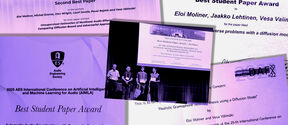Highlights
A survey on users' experiences of Mykanta in collaboration between Aalto University and Kela
Senior university lecturer Sari Kujala's research group is exploring, in collaboration with Kela, users' experiences with the Mykanta online patient portal and the MyKanta mobile application.
Specialised AI models could be Finland's next global export
Finland has the potential to build AI solutions that are different from ChatGPT-like large language models. Aalto University's School of Electrical Engineering already has decades of experience in developing specialised, resource-efficient AI models. They could be a key component of future 6G networks, automation, and industrial systems – and the next competitive edge of our country.
Professor Patric Östergård becomes a member of the Finnish Society of Sciences and Letters
Finnish Society of Sciences and Letters is Finland's oldest science academy. It promotes scientific discussion, publishes scientific literature, awards prizes and provides financial support for research.
Postdoctoral researcher Eloi Moliner makes history as a 5-time award winner
Eloi Moliner doesn’t brag about his achievements: being one of the most decorated doctoral researchers in Aalto University’s history or getting headhunted for prestigious research internships across the globe. However, his community would like to highlight his success and contributions to the field of audio signal processingEvents

HAIC Talk: The Cornucopia of security research is stuffed with AI — with Markus Miettinen
The HAIC public outreach initiative aims to make cybersecurity more accessible to a broader audience. As part of this initiative, are organizing HAIC Talks, a series of public lectures on contemporary topics in cybersecurity. In the style of studia generalia, these lectures are free and open to everyone. No background knowledge in cybersecurity is required. HAIC Talks are made possible through the generous support of the Aalto University School of Science.Helsinki CS Theory Seminar
The seminar is a weekly series of talks on a broad scope of CS theory hosted by Helsinki Algorithms and Theory. On this page, you will find a brief overview of each talk, past and future. To subscribe to our mailing list, please visit this page. The mailing list supplies calendar invitations to the talks including Zoom-links for live-streaming.


